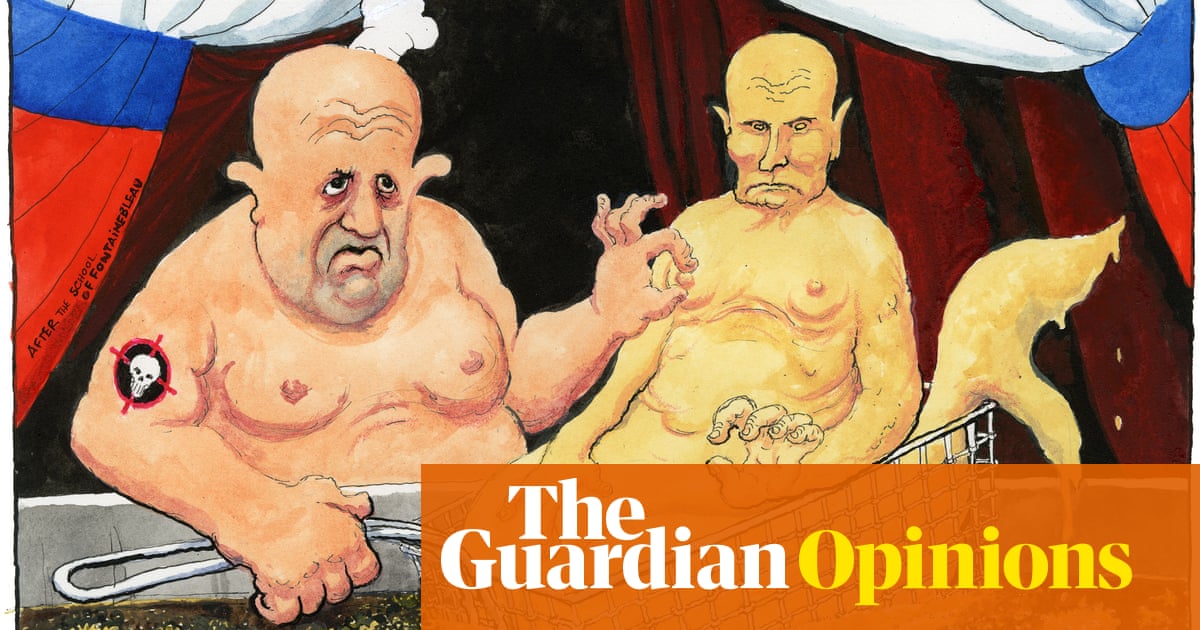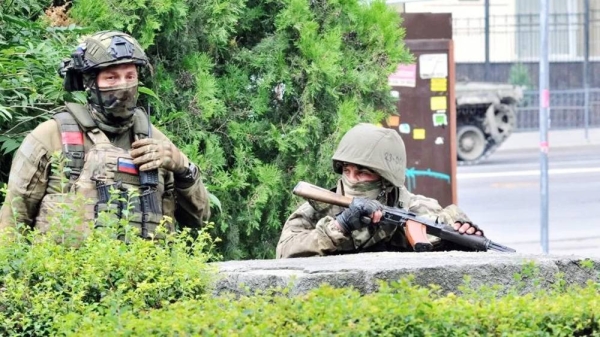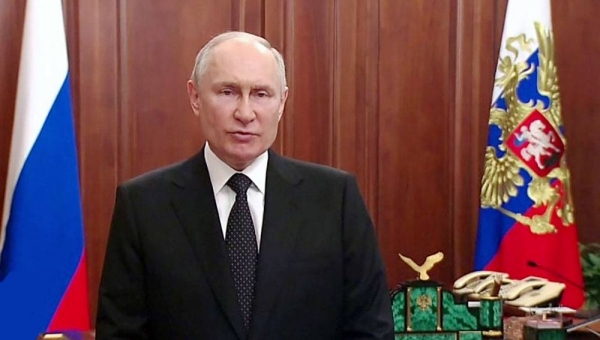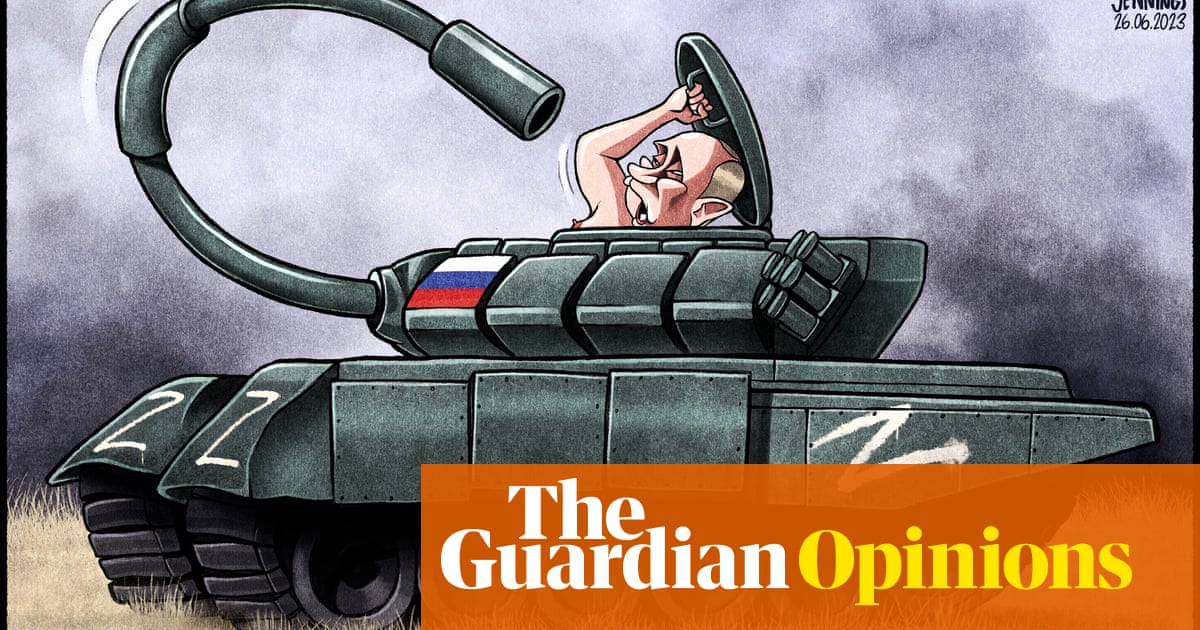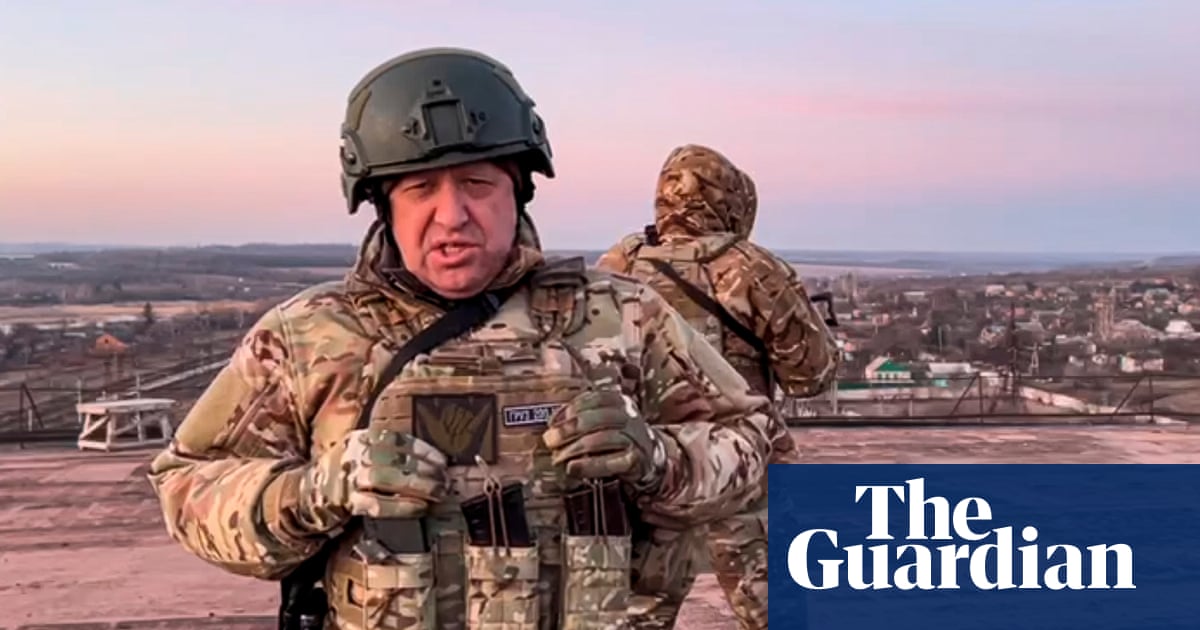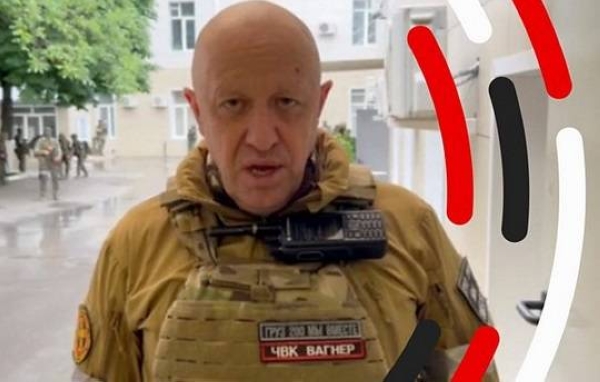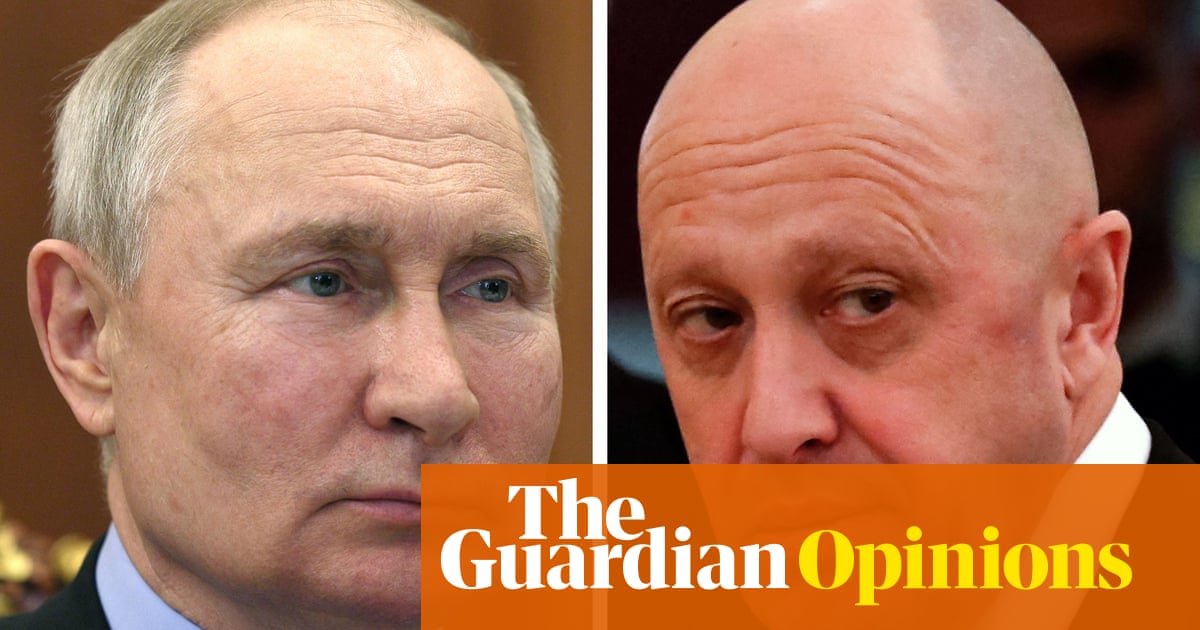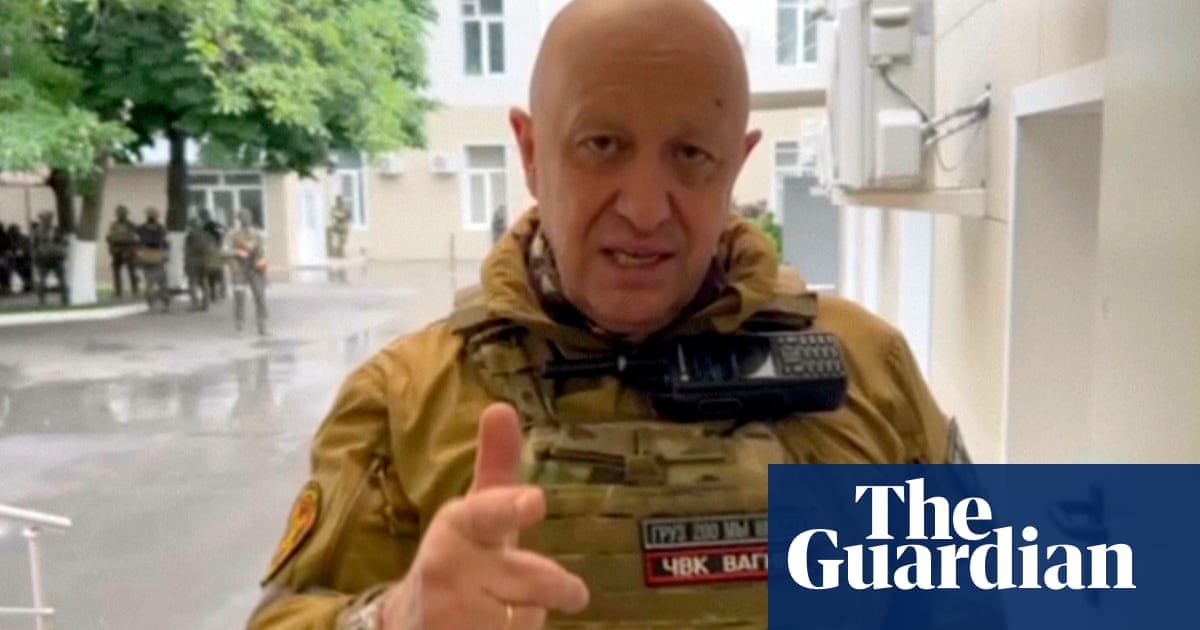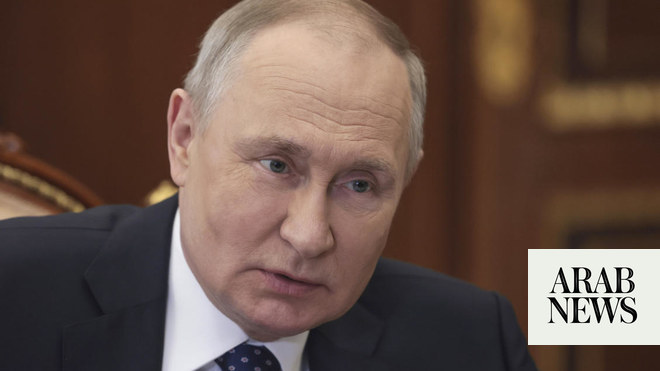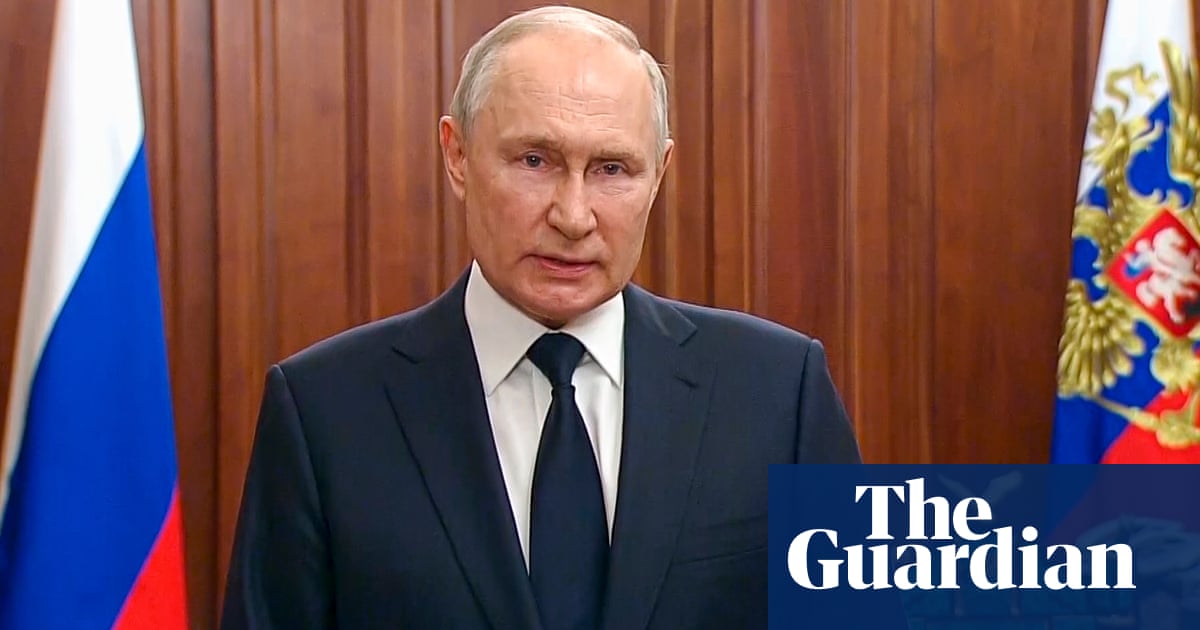
Vladimir Putin has claimed that Wagner chief Yevgeny Prigozhin’s uprising was “doomed to fail” and said the country showed “unity” in the face of a “treacherous” rebellion.
In an unscheduled late night televised address late on Monday, a visibly angry Putin said: “Any blackmail or way to bring confusion to Russia is doomed to failure … I made steps to avoid large bloodshed.”
In his first public appearance since Prigozhin abandoned his armed mutiny on Saturday evening, the Russian president thanked Wagner fighters and commanders who he said had stood down to avoid bloodshed.
Without mentioning Prigozhin by name, Putin said the organisers of the rebellion “betrayed their country, their people”. He said that the enemies of Russia “wanted Russian soldiers to kill each other, to kill military personnel and civilians, so that in the end Russia would lose, and our society would split, choke in bloody civil strife”.
The Russian president appeared to suggest that the Wagner group would still be shut down, saying that the group’s fighters had the choice to sign a contract with the ministry of defence or relocate to Belarus if they wanted to, as part of a settlement negotiated with the Belarusian leader, Alexander Lukashenko.
The Kremlin previously said that it guaranteed Prigozhin’s safe passage to Belarus but Putin’s remarks indicated that other Wagner fighters could follow Prigozhin to Belarus.
“The majority of Wagner commanders and fighters are patriots. They were used covertly against their brothers-in-arms,” he said.
Shortly after his Putin, the Kremlin released a video showing the Russian president meeting the head of Russia’s main domestic security service, including defence minister Sergei Shoigu, who Prigozhin vowed to remove during his rebellion.
Putin’s unscheduled appearance came just hours after Prigozhin issuing a defiant 11-minute statement in which he defended the Wagner uprising and denied that he had sought to topple the Russian president.
Prigozhin said the rebellion had shown that there were “serious problems with security on the whole territory of our country” and that “society demanded it” because of the failures of Russia’s military leadership in the invasion of Ukraine.
“It was not our goal to overthrow the regime,” Prigozhin said in the voice memo, that was uploaded to his Concord Group’s Telegram page. It was his first statement since 6.30pm on Saturday, when he departed the city of Rostov with his Wagner troops.
“We stopped at that moment, when it became clear that much blood would be spilled,” he continued, describing the progress of a military convoy that reached striking distance of Moscow. “That’s why we believe that the demonstration of what we were planning to do was enough. Our decision to turn back had two factors: we didn’t want to spill Russian blood. Secondly, we marched as a demonstration of our protest.”
In the statement, Prigozhin did not confirm his whereabouts or say if he was planning to move into exile in Belarus.
Prigozhin was rumoured to have been spotted at the Green City hotel in Minsk on Monday, according to the Russian news channel Brief. A receptionist at the hotel contacted by the Guardian said she “could not share any information” about guests.
Prigozhin said his troops would resist being subsumed under the Russian defence ministry, would not sign contracts, and that Wagner may even be allowed to continue its operations in Belarus, a development that could increase the threat of an attack in Ukraine’s north.
“Lukashenko extended his hand and offered to find solutions for the further work of [Wagner] in a legal jurisdiction,” he said, without offering more detail.
The Russian independent news site Verstka on Monday said it had identified several sites in Belarus that Wagner may be allowed to use in order to reconstitute its training camps and establish operations.
That would be an extraordinary turn of events for the paramilitary leader, whom Putin accused of a “stab in the back” just two days ago. Although the Kremlin had guaranteed his safe passage to Belarus, Russian state media reported that Prigozhin was still under investigation for provoking an armed uprising as recently as Monday morning.
If he was now allowed to maintain control of Wagner and avoid a jail cell, it would suggest that Prigozhin still has leverage in the Kremlin and is still seen as a valuable asset, despite having brought the country to the brink of civil war this weekend.
Analysts have said that the conflict was an extraordinary case of the types of rivalries that are allowed to develop under Putin, but usually resolved when he issues a judgment.
“I don’t think that this was an attempt to replace Putin,” Rob Lee, a US-based expert on the Russian military, said before Prigozhin’s reappearance. “I think basically this was a factional dispute between two important Russian figures that became a challenge to Putin, which is the abnormal part of this.”
Joe Biden said the US did not support any side in the uprising after some Russian officials and propagandists claimed that Washington had sought to exploit divisions in the Russian government.
“We made clear we were not involved. We had nothing to do with this,” Biden said in his first comments on the aborted mutiny.
Prigozhin did not abandon his feud with the defence ministry, once again accusing the army of targeting his troops with artillery fire, calling it the “trigger for us to move out immediately”.
He said: “The goal of the march was to not allow the destruction of the Wagner private military company and hold to account the officials who through their unprofessional actions have committed a massive number of errors. Society demanded it.”
Prigozhin acknowledged that his troops had killed Russian airmen during the uprising, saying they “regretted that they were required to carry out strikes against aircraft, but they were hitting our forces with bombs and rocket strikes”. Wagner troops shot down an Il-22 plane and several helicopters, footage has shown.
Prigozhin also claimed the Wagner forces’ incursion into Russia was a “masterclass” in how Moscow should have carried out its 24 February 2022 invasion of Ukraine, which failed to achieve its goal of taking Kyiv. “If mercenaries from Wagner had been carrying out the tasks, perhaps the ‘special operation’ would have lasted a day,” he said, referring to the invasion.
Members of the government sought to project calm on Monday, as emergency measures were rescinded and a sense of uneasy calm returned to life in major cities.
Mikhail Mishustin, the country’s prime minister, said Russia had faced “a challenge to its stability” and had to remain united behind Putin, speaking at a televised government meeting.
“The consolidation of the whole of society is especially important; we need to act together, as one team, and maintain the unity of all forces, rallying around the president,” he said.
Earlier on Monday, Shoigu reappeared in footage showing him “visiting the forward command post of one of the formations of the ‘western’ group of troops”. In the video, Shoigu is shown riding in a vehicle and arriving at a command post, where he listens to reports from officers and pores over a battlefield map.
However, the video was released without sound and it was unclear when and where it was filmed.
Officials in Moscow city, the Moscow region, and the Voronezh region announced they would end counter-terrorism regimes introduced on Friday, when it appeared Russia could see large-scale conflict between the mercenaries and the regular army.
Law enforcement agencies ordered evacuations of major cultural institutions including the Pushkin Museum and GES-2 cultural centres, and Gorky Park, cancelled cultural and musical events and introduced a blanket ban on public events.
Troops have also been dismantling barricades and repairing roads blocked with anti-tank traps set up to stop the Wagner convoy. Monday was declared a public holiday in order to reduce the number of people congregating on the streets.




